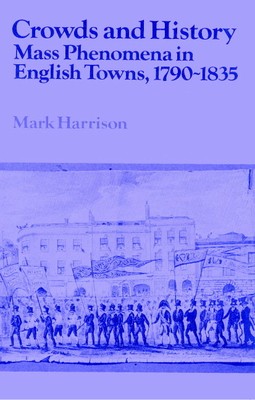
- We will send in 10–14 business days.
- Author: Mark Harrison
- Publisher: Cambridge University Press
- ISBN-10: 0521520134
- ISBN-13: 9780521520133
- Format: 14 x 21.6 x 2.2 cm, minkšti viršeliai
- Language: English
- SAVE -10% with code: EXTRA
Reviews
Description
In the late eighteenth and early nineteenth centuries, urbanisation 'revolutionised' English society as much as industrialisation. Central to this urbanising process, and the civic culture it inspired, was the bringing together of people in large numbers - to celebrate, commemorate, vilify or validate. Contemporary observers found the power and potential of urban crowds both awesome and alarming. They witnessed the capacity of the masses to confer honour and prestige upon a proud city elite or, by turning hostile, to bring civic ruin. Yet this ambivalent relationship between the individual and the crowd, which resonates through not only the nineteenth century but all human history, has remained generally ignored by historians. They have regarded crowds almost exclusively as a riotous, disruptive and protesting force. This book, which is the first systematic historical study of mass phenomena, challenges such preconceptions and re-defines the place of the crowd in history.
EXTRA 10 % discount with code: EXTRA
The promotion ends in 21d.06:45:29
The discount code is valid when purchasing from 10 €. Discounts do not stack.
- Author: Mark Harrison
- Publisher: Cambridge University Press
- ISBN-10: 0521520134
- ISBN-13: 9780521520133
- Format: 14 x 21.6 x 2.2 cm, minkšti viršeliai
- Language: English English
In the late eighteenth and early nineteenth centuries, urbanisation 'revolutionised' English society as much as industrialisation. Central to this urbanising process, and the civic culture it inspired, was the bringing together of people in large numbers - to celebrate, commemorate, vilify or validate. Contemporary observers found the power and potential of urban crowds both awesome and alarming. They witnessed the capacity of the masses to confer honour and prestige upon a proud city elite or, by turning hostile, to bring civic ruin. Yet this ambivalent relationship between the individual and the crowd, which resonates through not only the nineteenth century but all human history, has remained generally ignored by historians. They have regarded crowds almost exclusively as a riotous, disruptive and protesting force. This book, which is the first systematic historical study of mass phenomena, challenges such preconceptions and re-defines the place of the crowd in history.


Reviews